The 1911 census shows that Alice and George were only 15 years older than Alfred, who was by then (April 1911) employed as a ledger clerk at ‘Universal Providers’ – a name used by Whiteleys department store, but also by grocery chain David Greig who had a shop a couple of miles away at Loughborough Junction.
ALFRED GEORGE LUDLOW: from Dover to Australia via Steventon (and back)
Alfred George Ludlow was born in Dover, Kent, in June 1888, son of Edwin (a railway guard) and Elizabeth (nee Hillier) Ludlow – at the time Alfred had at least seven older brothers and one older sister (Edith Maud), and there were at least two more sons and a daughter (Dorothy) born after Alfred.
The family were still living in Clarendon Street, Dover, in 1901, but by 1910 Alfred had moved in with his uncle, aunt, three children and another boarder in Peckham: Uncle George Cruse was a bookseller’s assistant at a wholesale newsagent and publisher; Aunt Alice (nee Hillier) was nearly 20 years younger than her sister Elizabeth. In December 1910 Alfred joined the Territorial Army’s 9th London Regiment: his attestation showed that he had previously been (a cadet?) in The Buffs (the Royal East Kent Regiment), and was a clerk at what might be read as Harrods Ltd (C House):
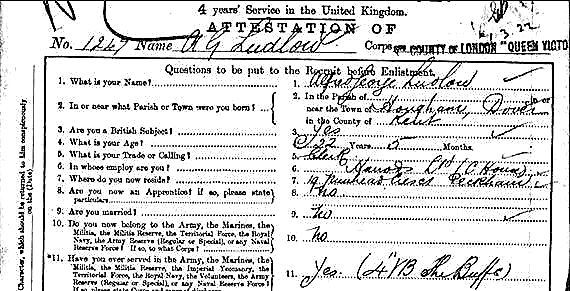
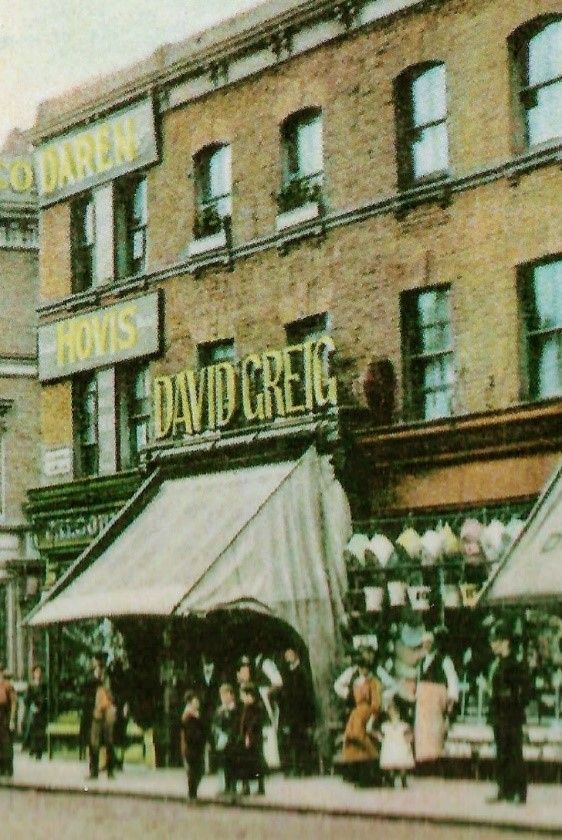
Also in 1911, Ada West - born in December 1889 in Storrington, West Sussex - was working as a book keeper at the family General Store in Cobham High Street, Surrey, run by her mother (Martha) and brother (Ernest). An older brother, Allen was running another grocer’s shop in Cobham with his wife Edith Maud (nee Ludlow) as sub-postmistress. Allen was also Parish Clerk, Verger & Sacristan at St Andrew’s Church, and a member of the Church Council 1913 -19.
Alfred was sent to France with the British Expeditionary Force in November 1914, where he was quickly promoted from Corporal to Sergeant before he was judged ‘Time Expired’ in November 1915 and returned to England where he was discharged in December.
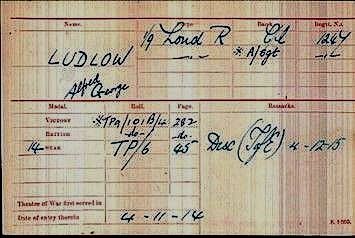
At some point Alfred must have got to know Ada through Edith – and they married in quarter 2 of 1916. Son Wilfred Norman was born in Cobham in March 1917, and then Eric Bertram in March 1919.
The established grocers in Steventon from the 1870s (not listed in the PO Directory in 1869 but in the 1877 Directory) until at least 1939 (Kellys Directory) were George Rant & Co, later Rant & Burgis (who in 1911 also had two shops in Abingdon plus others in Marcham, Longworth, and Faringdon), and by the 1920s Rant & Tombs: there were ten Rant & Tombs shops in Abingdon and district in 1930 including one in Steventon.
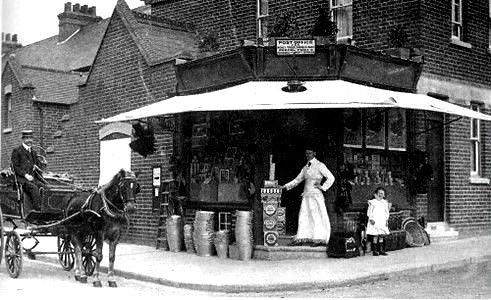
Rant’s grocery shop, Spring Road, Abingdon c. 1910.
From: https://www.heraldseries.co.uk/news/18002684.heralding-past-corner-shops-abingdon/
However, there were also other grocers in the village: Thomas Richardson is listed in the PO Directory 1869; Matthew Baker in Kellys 1887; John & Eliza Margetts 1895 until at least 1912; Walter White in Kellys 1915.
What then brought the young Ludlow family to Steventon is unknown, but Kelly’s Directory for 1920 lists Rant & Burgis as grocers and Alfred George Ludlow at an unspecified address in Steventon as grocer & tea dealer, draper, boot and shoe factor, and hardware dealer: another regular ‘universal provider’! The 1921 census shows Alfred and Ada living on the Causeway, which is also given as their place of work, with youngest son Eric and Ada’s mother Martha. Ernest West, Ada’s brother and Martha’s partner in the Cobham grocers, had died in the influenza epidemic that followed the war. Wilfred has stayed in Cobham with Allen and Edith West, and Alfred’s youngest sister Dorothy is living with them and helping in the shop.
Denis E(dwin – after his grandfather?) Ludlow was born in Steventon in October 1922, and Betty Rhona in quarter 3 of 1924. Kelly’s Directory for 1924 lists Rant & Tombs and Ludlows shops: Dick Bosley discovered an advertisement in the Parish Magazine in 1924 for A G Ludlow which gives the shop address as ‘The Avenue, Steventon’ – which we can only speculate may have been a local/family name for Causeway at the time.
The Ludlow’s grocery business was however short-lived as the family left the UK in April 1925 to emigrate to Australia on the P&O liner ‘Baradine’: Alfred gave his profession as Grocer, and his address as The Avenue, Steventon. Charles Giles seems to have taken over the premises used by Ludlows and is then listed in Kellys until at least 1939.
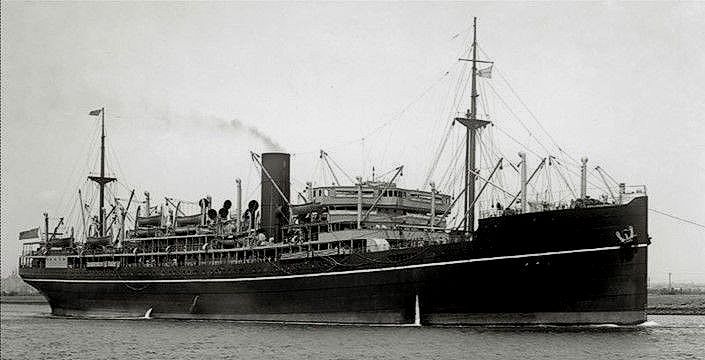
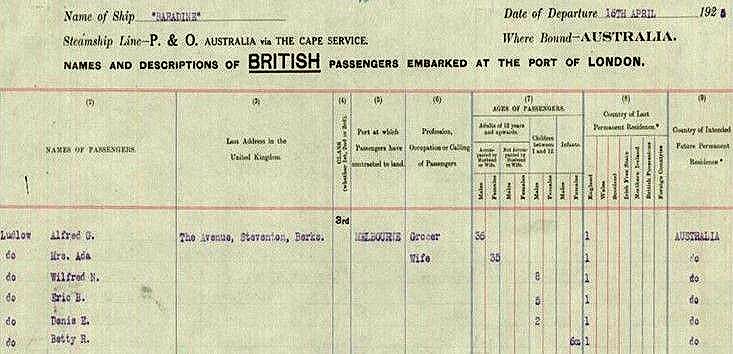
P&O liner 'Baradine' (built by Harland & Wolff in 1921).
Hover on picture for the passenger list.
The family landed in Melbourne, having been assured in a prospectus from the government of the state of Victoria that they would be able to run a profitable business: they set up a poultry farm on 22.5 acres of land at Narre Warren North – a (then) mostly rural area south-east of central Melbourne.
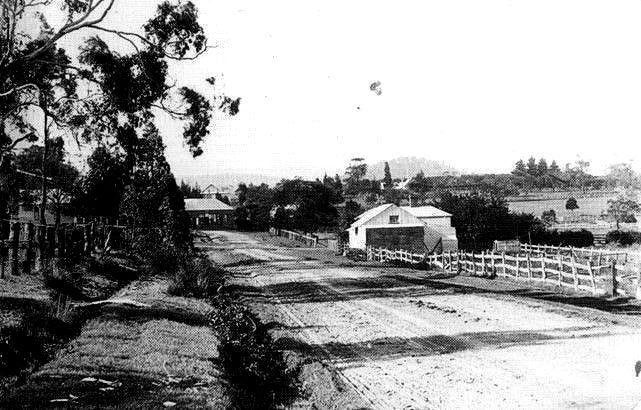
Narre Warren North in 1895. The old store and the Mechanics' Institute is in the background and Raduchel's blacksmith shop on the right.
From https://caseycardinialinkstoourpast.blogspot.com/
Alfred became president of the Narre Warren branch of the British Overseas Settlers’ Association – many of whose members, it seems, became disenchanted with the differences between what had been promised and what they actually found. Letters were sent to the Australian and British newspapers, and representations were made to the state government.
Alfred was one of the settlers who attended a meeting in April 1930 discussing drainage problems (reported in the Melbourne Weekly Times of 12th April 1930) and in May 1931 he gave evidence to a commission looking into migrants’ complaints. He is recorded as having said: “I have no faith or confidence in the country. I have had a pretty bad spin. I have lost £1400” (over £100,000 in today’s terms). He was asked whether he wanted to stay on his land and replied “Yes, but I want to see that it is absolutely certain that I can be satisfactorily settled. It was stated on the prospectus that the land is suitable for intense culture. The former owner of the land had grown oats on the land until it would not grow oats any more, and then sold it to the Water Commission.” He also said that the reason he had not continued with poultry- farming was that it was unprofitable. There was no export trade at that time, and there were gluts in the market. The land was over-capitalised. (This all as reported in the Melbourne Argus of 12th May 1931).
The Melbourne Sun News-Pictorial reported on 17th February 1933:
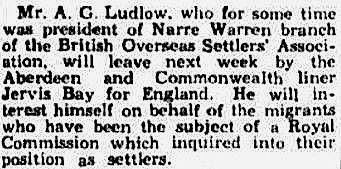
When the whole Ludlow family left Australia and returned to England is unclear, but by the 1939 Register they were living in Wooton and employed (although the Genealogist’s transcription has renamed half the family ‘Sudlow’):